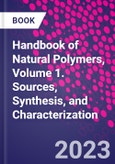The Handbook of Natural Polymers: Sources, Synthesis, and Characterization is a comprehensive resource covering extraction and processing methods for polymers from natural sources, with an emphasis on the latest advances.
The book begins by introducing the current state-of-the-art, challenges, and opportunities in natural polymers. This is followed by detailed coverage of extraction, synthesis, and characterization methods, organized by polymer type. Along with broad chapters discussing approaches to polysaccharide-based polymers, dedicated chapters offer in-depth information on nanocellulose, chitin and chitosan, gluten, alginate, natural rubber, gelatin, pectin, lignin, keratin, gutta percha, shellac, silk, wood, casein, albumin, collagen, hemicellulose, polyhydroxyalkanoates, zein, soya protein, and gum. The final chapters explore other key themes, including filler interactions and properties in natural polymer-based composites, biocompatibility and cytotoxicity, biodegradability, life cycle, and recycling. Throughout the book, information is supported by data, and guidance is offered regarding potential scale-up and industry factors.
As part of a 3-volume handbook offering comprehensive coverage of natural polymers, this book will be of interest to all those looking to gain a broad knowledge of natural polymers, including academic researchers, scientists, advanced students, engineers, and R&D professionals from a range of disciplines and industries.
Please Note: This is an On Demand product, delivery may take up to 11 working days after payment has been received.
Table of Contents
1. The state of the art of biopolymers, challenges and opportunities, and future prospects2. Extraction and classification of starch from different sources: structure, properties and characterization
3. Starch as a promising replacement for synthetic polymers, and starch-based composites, blends, IPNs and Gels
4. Extraction of Nanocellulose from natural resources
5. Nanocellulose a promising reinforcement for polymers
6. Commercialization of polysaccharides: Lab to industry
7. Extraction of chitin and chitosan and its structural evaluation
8. Chitin and Chitosan based polymer blends, IPNs and gels
9. Antibacterial activity of Chitin and Chitosan
10. Grafted natural polymers: synthesis and structure property relationships
11. Isolation of Gluten from wheat flour and structural analysis
12. Extraction of alginate from different natural resources
13. Physical and chemical impact of nanoparticles reinforced alginate-based biomaterials
14. Natural Rubber based micro and nanocomposites
15. Gelatin based polymer blends, IPNs, Gels, cryogels, and aerogels
16. Isolation and structural evaluation of Pectin; Pectin based polymer blends, composites, IPNs and gels
17. Extraction of lignin and their blends, composites, IPNs and gels
18. Isolation and processing of Keratin based polymer blends, composites, IPNs and gels�
19. Gutta Percha a natural biopolymer: Isolation, classifications, and property analysis�
20. Isolation and classifications of Shellac
21. Silk based natural biomaterials: Extraction and characterization
22. Wool a natural biopolymer: Extraction and structure property relationships
23. Extraction and properties of casein biopolymer from milk
24. Synthesis and characterization of Albumin incorporated with nanomaterials
25. Synthesis and characterization of collagen
26. Extraction of hemicellulose and characterizations
27. Bioconversion of waste to polyhydroxyalkanoates a circular bioeconomy approach
28. Different sources, extraction, and characterization of zein
29. Isolation and characterization of soya protein
30. Extraction and physicochemical characterization of gum
31. Effect of fillers and filler-host interactions on the properties of natural polymer-based composites
32. Biocompatibility and cytotoxicity studies of natural biopolymers
33. Biodegradability, life cycle analysis, recycling of natural biopolymers
Authors
M.S. Sreekala Associate Professor, School of Chemical Sciences, Mahatma Gandhi University, Kottayam, Kerala, India, and Joint Director, International and Inter-University Centre for Nanoscience and Nanotechnology and School of Nanoscience and Technology, Mahatma Gandhi University, Kottayam, Kerala, India. Dr. M. S. Sreekala is a Associate Professor at the School of Chemical Sciences. She is also serving as the Director of the School of Polymer Science and Technology and Joint Director of the School of Nanoscience and Technology and International and Inter University Centre for Nanoscience and Nanotechnology, Mahatma Gandhi University (MGU), Kerala, India. Lakshmipriya Ravindran Assistant Professor, School of Energy Materials, Mahatma Gandhi University, Kottayam, Kerala, India. Dr. Lakshmipriya Ravindran is a Assistant Professor at the School of Energy Materials, at the Mahatma Gandhi University in India. She has published a good number of scientific articles in the high-impact factor international journals and one of her articles is indexed as "Top Downloaded Article� of the year. Koichi Goda Full Professor, Department of Mechanical Engineering, Yamaguchi University, Japan. Prof. Koichi Goda is Chair of Mechanical Engineering and Full Professor, in the Department of Mechanical Engineering, at Yamaguchi University, Japan. Prof. Goda has significant experience in areas including biopolymers, composite materials, reliability, and nanotechnology, with recent research focusing on green composites. He has received numerous awards for his work in including most recently the Meritorious Contribution Award from JCOM (Committee on Composite Materials of JSMS - The Society of Materials Science, Japan) in 2018, and the JSMS Award for Distinguished Service to Chugoku Branch in 2020. Sabu Thomas Professor and Director, International and Interuniversity Centre for Nanoscience and Nanotechnology, Mahatma Gandhi University, India.Prof. Sabu Thomas is a Professor of Polymer Science and Engineering and the Director of the School of Energy Materials at Mahatma Gandhi University, India. Additionally, he is the Chairman of the Trivandrum Engineering Science & Technology Research Park (TrEST Research Park) in Thiruvananthapuram, India. He is the founder director of the International and Inter-university Centre for Nanoscience and Nanotechnology at Mahatma Gandhi University and the former Vice-Chancellor of the same institution.
Prof. Thomas is internationally recognized for his contributions to polymer science and engineering, with his research interests encompassing polymer nanocomposites, elastomers, polymer blends, interpenetrating polymer networks, polymer membranes, green composites, nanocomposites, nanomedicine, and green nanotechnology. His groundbreaking inventions in polymer nanocomposites, polymer blends, green bionanotechnology, and nano-biomedical sciences have significantly advanced the development of new materials for the automotive, space, housing, and biomedical fields. Dr. Thomas has been conferred with Honoris Causa (DSc) by the University of South Brittany, France.








